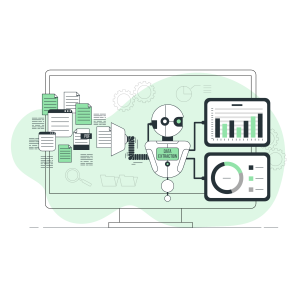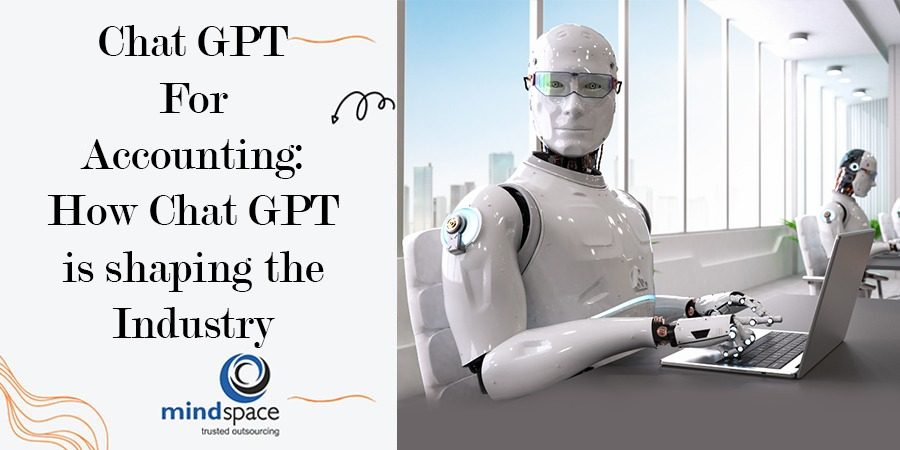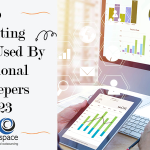Chat GPT For Accounting: How Chat GPT is shaping the Industry
Chat GPT for Accounting: As the world is becoming more digital, industries are also adapting to new technologies to streamline their operations. One such industry that is rapidly changing is accounting, where the use of artificial intelligence (AI) is revolutionizing the way accountants work. One of the most significant developments in the field of accounting is the emergence of Chat GPT, an AI-powered chatbot that is shaping the future of accounting.

Chat GPT For Accounting:
In the past, accountants have relied on manual data entry, spreadsheet analysis, and time-consuming audits to manage financial records. However, with the advancement of technology, the accounting industry is now turning to AI-powered tools like Chat GPT for accounting to automate many of these processes. Chat GPT is a chatbot that uses natural language processing (NLP) to understand and respond to user queries. The chatbot is designed to help accountants and business owners manage their financial records more efficiently and accurately.
The Emergence of Chat GPT in Accounting
Chat GPT is a language model that uses deep learning algorithms to generate responses to user queries. The chatbot is trained on vast amounts of data to understand the context of user questions and provide accurate answers. In the accounting industry, Chat GPT is being used to automate tasks such as data entry, invoice processing, and financial analysis. The chatbot can also provide real-time financial insights and recommendations based on the data it analyzes.
Benefits of Using Chat GPT in Accounting
The use of Chat GPT in accounting has several benefits. Some of them are
- The chatbot can save accountants and business owners a lot of time by automating routine tasks. This allows them to focus on more complex tasks that require their expertise.
- Chat GPT can improve the accuracy of financial records by eliminating errors that can occur during manual data entry.
- The chatbot can also help identify fraudulent transactions by analyzing large amounts of data in real-time.
Chat GPT and Customer Service
Chat GPT is not only useful for internal accounting processes but can also be used for customer service. The chatbot can provide real-time responses to customer queries, allowing businesses to improve their customer service experience. For example, if a customer has a question about their invoice, they can ask the chatbot, which can provide a quick and accurate response.
Chat GPT and Data Analytics
One of the most significant benefits of using Chat GPT in accounting is its ability to perform data analytics. The chatbot can analyze large amounts of financial data and provide insights into business performance. For example, Chat GPT can identify patterns in sales data, helping businesses make informed decisions about inventory management and marketing strategies.
Chat GPT and Auditing
Chat GPT can also be used for auditing processes. The chatbot can review financial records and identify inconsistencies or errors, allowing accountants to investigate and resolve issues quickly. This can help ensure that financial records are accurate and compliant with regulatory requirements.
Chat GPT and Future of Accounting Education
The use of Chat GPT in accounting is not limited to businesses and accounting firms. The chatbot can also be used to educate accounting students. By interacting with Chat GPT, students can learn about accounting concepts and principles in a more interactive and engaging way. This can help improve their understanding of accounting and prepare them for a career in the industry.
FAQs about Chat GPT For Accounting
What is Chat GPT, and how does it work in accounting?
Ans. Chat GPT is an AI-powered chatbot that uses natural language processing to understand and respond to user queries. In accounting, Chat GPT can be used to automate tasks such as data entry, invoice processing, and financial analysis.
Can Chat GPT replace accountants?
Ans. No, Chat GPT cannot replace accountants. While the chatbot can automate routine tasks, accountants still play a critical role in managing financial records and providing expert advice.
How does Chat GPT benefit businesses?
Ans. Chat GPT can benefit businesses by saving time, improving the accuracy of financial records, and providing real-time financial insights and recommendations based on data analysis.
How can Chat GPT improve customer service in accounting?
Ans. Chat GPT can improve customer service in accounting by providing real-time responses to customer queries, allowing businesses to provide a better customer service experience.
Can Chat GPT be used for auditing processes?
Ans. Yes, Chat GPT can be used for auditing processes by reviewing financial records and identifying inconsistencies or errors.
How can Chat GPT be used for accounting education?
Ans. Chat GPT can be used for accounting education by interacting with students and teaching them about accounting concepts and principles in a more interactive and engaging way.
Conclusion
The emergence of Chat GPT in accounting marks a significant change in the way the industry operates. With the automation of routine tasks, the role of accountants is evolving, and they are becoming more strategic advisors to businesses. Chat GPT for accounting is shaping the future of accounting by providing businesses with real-time insights, improving customer service, and optimizing financial processes.
While Chat GPT cannot replace accountants, it can certainly enhance their role and make their jobs more efficient. As technology continues to advance, we can expect to see more innovative solutions being developed that will further improve the efficiency and accuracy of accounting processes.
In conclusion, Chat GPT for accounting is a game-changer in the accounting industry, and businesses that embrace this technology will have a competitive edge over their peers. By leveraging the power of chatbots, businesses can streamline their financial processes, save time, and make better-informed decisions based on data insights.


